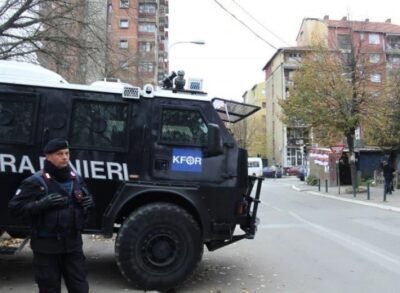North Macedonia (Brussels Morning Newspaper), The recently declassified 2024 Annual Threat Assessment of the US Intelligence Community had this to say about the Western Balkans:
“The Western Balkans probably will face an increased risk of localized interethnic violence during 2024.
Nationalist leaders are likely to exacerbate tension for their political advantage and outside actors will reinforce and exploit ethnic differences to increase or protect their regional influence or thwart greater Balkan integration into the EU or Euro–Atlantic institutions.

• Clashes between Serb nationalists and Kosovar authorities have led to deaths and injuries, including injuries to NATO peacekeepers, in 2023.
• Bosnian Serb leader Milorad Dodik is taking provocative steps to neutralize international oversight in Bosnia and secure de facto secession for his Republika Srpska. His action could prompt leaders of the Bosniak (Bosnian Muslim) population to bolster their capacity to protect their interests and possibly lead to violent conflicts that could overwhelm peacekeeping forces.”
The annual assessments enjoy a poor reputation among intelligence pros the world over. They are considered as little more than a glorified compilation of press cuttings. Its authors tend to mindlessly extrapolate current events linearly into the future. Consequently, they rarely get their predictions right.
The only two specific prognostications in the current edition are similarly dubious at best.
In Kosovo, a far likelier long-term outcome is the ethnic cleansing of the indigenous Serbs by the Kurti government with a wink and a nod from the anti-Vucic, anti-Russian Western powers.
Sporadic skirmishes with Serb paramilitaries aside, Kosovo is inexorably turning into an ethnically homogenous, widely diplomatically recognized state, firmly aligned with the West in its proxy wars with Russia. Serbia and Serbs, as usual, are on the wrong side of history.
As for Dodik, he is the rule, not the exception. The Croats in Bosnia and Herzegovina threatened to secede in 2022. Such brinkmanship is aimed at extracting concessions from the EU and from the other constituents of this artificial polity. It is not an actual political platform. It is a poker bluff.
What is needed is a synoptic, bird’s-eye view: tensions abound in all the geopolitical fault lines: Taiwan, Ukraine, Israel, the Balkans, and South and Central America. The accelerating decline of the USA has created a yawning power gap and regional actors such as China, Russia, and Iran are rushing in to fill the vacancy. New alliances are superimposed on historical enmities. It is a period of tumultuous global transition and the Western Balkans is no exception.
Opinions expressed in the op-ed section are solely those of the individual author and do not represent the official stance of our newspaper. We believe in providing a platform for a wide range of voices and perspectives, even those that may challenge or differ from our own. As always, we remain committed to providing our readers with high-quality, fair, and balanced journalism. Thank you for your continued support.Sincerely, The Brussels Morning Team




